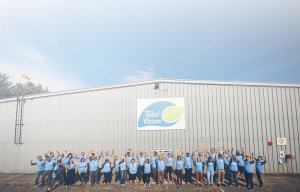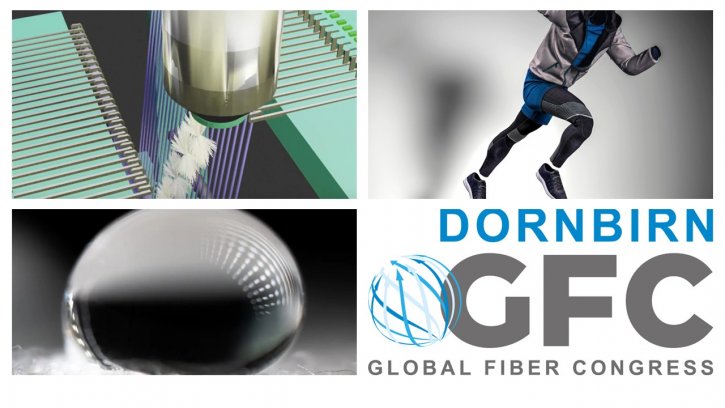
Milliken backs chitosan innovator
First Dornbirn GFC Innovation Award will recognise a new product combining technical ingenuity with successful market application.

8th August 2025
Innovation in Textiles
|
Dornbirn, Austria
The 5th Dornbirn GFC Innovation Days will be held alongside the 64th Dornbirn Global Fiber Congress (GFC) from September 10-12, 2025 in the Austrian town.
It will showcase pioneering companies, ambitious start-ups and leading research institutions developing breakthrough solutions with real-world relevance.
This year, for the first time, the Dornbirn GFC Innovation Award will be presented to recognise the most compelling innovation combining technical ingenuity with successful market application.
Cellulosics
Among companies taking part is Fibers365, based in Lenningen, Germany, the developer of SteamFiber Technology, which enables the production of chemicals-free non-wood cellulose pulp and biopolymers.
The patented process combines hydrothermal biomass conversion with a rapid steam expansion (RSE) step, followed by purpose-designed refining and water-saving washing cycles. The entire process eliminates the need for acidic or caustic chemicals, as well as organic solvents, to create a new cellulose pulp for packaging, tissue, fibre moulding and other applications.
Fibers365 cellulose pulp from wheat straw has similar strength to short fibre and hardwood pulp, and in some applications can even replace softwood pulp. It can also be used as a feedstock for the fermentation of PHA, lipids and other biochemical applications to provide optimised pentose and hexose yields after enzymatic conversion.
Fibers365 is teaming up with agro-industrial companies and the processing industry as well as regional farmers, bioenergy producers and green investors with the aim of establishing a worldwide infrastructure of de-centralised SteamFiber plants.
Nanocellulose-based aerogels
Another materials specialist is Graz, Austria-based FreyZein which among various activities is working with the European Space Agency on the ESA Spark project, aiming to create mono-material cellulosic solutions tailored for extreme performance, including loose paddings and nonwoven fabrics incorporating nanocellulose-based aerogels.
Embeded aerogels promise to achieve superior insulation performance at a fraction of the thickness and weight of traditional materials.
Also working with new natural fibre alternatives is London-based Baneco, which has developed a process to convert agri-waste from banana production into sustainable materials and is establishing a supply chain for it, while Israeli startup Axiv Materials is behind a new type of biodegradable fibre that is produced from protein waste.
Customised structures
Casmue, based in Bremen, Germany is meanwhile the inventor of V-Shed technology for inserting third materials between the yarn layers during weaving, to create multi-material constructions.
V-Shed technology enables double-weave, spacer fabric, filling-on-the-fly and 3D constructions to be achieved with sticky, loose, brittle, fluffy or still hardening/curing materials that can’t be handled in a conventional weaving system.
The V-Loom uses no shafts and its reed is positioned outside the shed, enabling a comprehensive range of products and patterns to be achieved with in a minimum of change-over time. The open shed is like a pocket into which materials can be filled, dropped or poured.
Double weave products, for example, can be filled from above to create mats with brittle or sticky fibres that are cured or hardened while weaving, for technical textile products such as seed containers and landscape protection products.
Spacer fabrics with closed sides can be filled with liquids, foams, particles or layers of additives to create stiff structures for applications including pipes, sensor systems or electrical parts.
Innovate and adapt
With nearly 200 presentations to be delivered and growing multi-sector participation, the Dornbirn Global Fiber Congress underscores the industry’s drive to innovate and adapt.
The programme spans 2.5 days, covering the central themes of Work and Protective Wear/Defence, Carbon Stewardship – from biomass to carbon capture – and Fibre Innovations. Short expert inputs followed by interactive panel Q&As will encourage open exchanges.
“Dornbirn GFC brings together a truly global community – researchers, innovators and industry leaders from across continents,” says Matthias Gluth, managing director of the Austrian Fiber Institute. “By creating the right environment for open exchange and collaboration, we’re accelerating the development and scale-up of fibre innovations worldwide.”

Business intelligence for the fibre, textiles and apparel industries: technologies, innovations, markets, investments, trade policy, sourcing, strategy...
Find out more